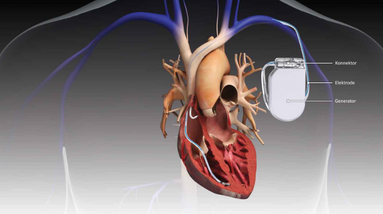
An implantable cardioverter-defibrillator (ICD) is a small, battery-powered device that is implanted in the chest to monitor and regulate the heartbeat. ICDs are used to treat certain heart conditions, such as ventricular tachycardia and ventricular fibrillation, which can cause the heart to beat abnormally fast or irregularly and can be life-threatening.
During the procedure, a small incision is made in the chest, and the ICD device is placed under the skin. One or more leads (thin wires) are then threaded through a vein and guided to the heart, where they are attached to the heart muscle. The leads transmit electrical signals from the ICD to the heart, and the device is able to detect abnormal heart rhythms and deliver electrical shocks or pacing to restore a normal heartbeat.
ICDs are designed to monitor the heart continuously and can provide different levels of therapy depending on the patient’s specific needs. For example, some ICDs are designed to provide pacing therapy to help regulate the heartbeat, while others are able to deliver more powerful electrical shocks to treat life-threatening arrhythmias.
After the ICD is implanted, patients are typically monitored in the hospital for a short period of time to ensure that the device is functioning properly. In most cases, patients are able to resume normal activities within a few days to a week after the procedure.
ICDs can be equipped with additional features, such as the ability to monitor heart rhythms and store data about heart activity over time. Some newer devices are also able to communicate wirelessly with healthcare providers, allowing for remote monitoring and adjustment of the device as needed.
Overall, implantation of an ICD is a safe and effective procedure that can help prevent life-threatening arrhythmias and improve overall heart function. With proper care and monitoring, ICDs can provide long-term support for the heart’s electrical system, helping to prevent complications and improve overall health.